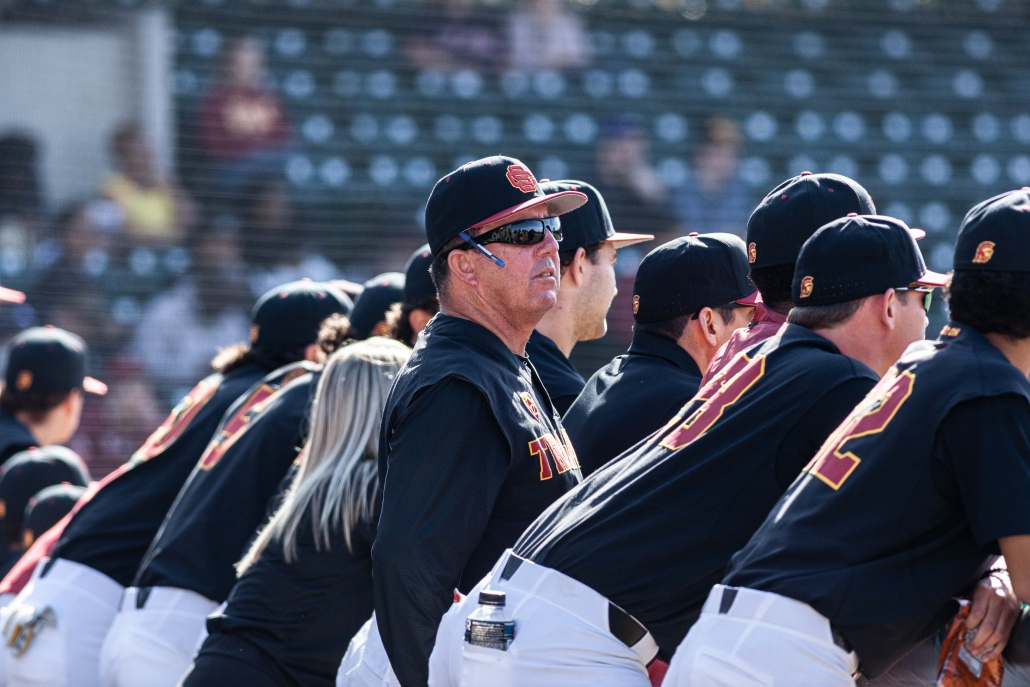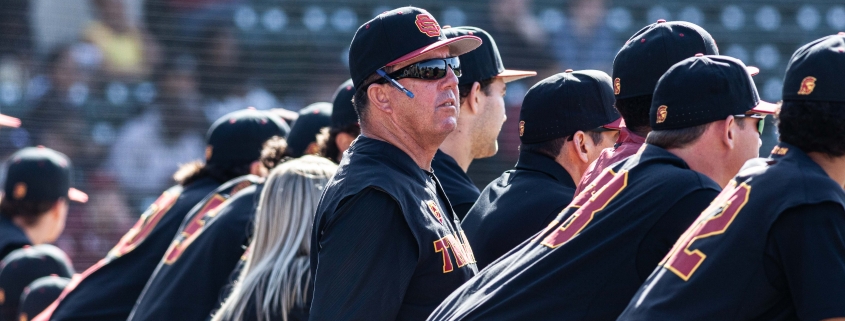Head coaches react to early season cancellations

A little past 7:45 p.m. last Wednesday, the USC baseball team finished off a 7-3 victory over visiting Xavier in a game that had been rescheduled the day before due to rain. It was a smooth game for USC. Junior shortstop Ben Ramirez went 2-for-4 with a couple of RBIs and a solo homer. Sophomore righty Ethan Reed pitched a couple innings and struck out three to earn the win. The skies were clear enough, and it was a relatively normal game for the Trojans — other than the fact that there were no fans in attendance due to USC’s restriction of home game spectators in response to the coronavirus pandemic.
And other than the fact that it would be the last Trojan win in any sport for the spring semester.
On Thursday, about 14 hours after the baseball game, USC men’s basketball head coach Andy Enfield and his team were getting ready for a Pac-12 Tournament showdown against Arizona. Enfield and the Trojans’ quarterfinal against the Wildcats was just five hours away.
That game — and the one right before it at noon between Oregon and Oregon State — would not be played. The entire sports world was effectively sent into oblivion.
Thursday developed like a firestorm. In the morning, all Power 5 conferences canceled their tournaments. By the end of the day, all NCAA championship competitions had been canceled for the rest of the semester.
The news found USC’s various spring sports coaches differently. Lacrosse head coach Lindsey Munday was on a bus to Arizona for a match. Baseball head coach Jason Gill found out through USC’s athletic administration. Water polo head coach Marko Pintaric found out on Twitter.
But each coach across USC’s winter and spring sports had to deal with the same reality: a season ripped away, taken by the most unthinkable and unexpected of circumstances.
“Every day, I actually feel like it stings a little more, to be quite honest,” men’s tennis head coach Brett Masi said. “You know, the first day was this kind of utter shock. And I think the guys are even still in a bit of shock. You don’t know what to do, how to react.”
The most immediate attention was placed on the men’s basketball team, which looked poised for a deep run in the conference tournament and a respectable seed in March Madness.
“It’s not just tough for our players but for seniors across the country,” said Enfield, who said he was on a conference call when the NCAA Tournament was canceled. “Our grad transfers never got to play in the tournament.”
But it wasn’t just basketball that could have made waves in NCAA championship competition. The women’s water polo team was ranked No. 1 in the country before the cancellation. Men’s tennis was No. 1. Lacrosse was No. 7. The baseball team was 10-5 on the young season and a few days removed from a victory over No. 2 Vanderbilt.
Just like that, after all the practices, games and anticipation, their seasons were over — done.
“Guys were crying, people were hugging each other,” Gill said. “You know, it’s different when you’re playing and you’re in the postseason or you know your final game’s coming up — you can prepare for that … But when you’re in the middle of something, and in fact, not even in the middle of it yet, we were just getting going, and it gets taken away — that’s a tough pill to swallow.”
After the initial shock and disappointment of the season’s end, the coaches then had to address their respective teams and process the fact that their NCAA competition would have to wait another year.
“I first sent the team email, and then we had a team meeting later that night so that we could be together, which, as you can imagine, was obviously the hardest meeting I’ve had as a coach,” Munday said. “It was obviously so out of the blue and so quick.”
Despite the disappointment, there’s little to do from here but move forward. And, at least for Pintaric, though the times are unlike any that USC or sports in general have ever seen, turbulence itself is nothing new.
“[The] last whole year, you learn how to get our disappointments very, very quick out of our way,” Pintaric said. “And then the shift [into a] kind of like an emergency mode to figure out what’s the next best step. So now we are in that mode.”
Gill shared a similar outlook.
“What I told the team was it’s not just USC, it’s the entire United States and a lot of the world, really,” Gill said. “So we could sit there and feel sorry for ourselves or we could try to find a way of turning a negative into a positive. And that’s what we’re gonna choose to do.”
What exactly are the teams’ next steps? Nobody’s really sure. But the coaches emphasized that, despite not having the rest of the season in front of them, they wouldn’t take time off from staying in touch with their players.
“I’m here when [the seniors] want to talk through these possible next steps, and obviously to the whole group,” Munday said. “We still want to stay connected as we can [be] even though we’re not together. First and foremost, [I told them] just to stay safe and to stay healthy.”
After all, eventually, when the coronavirus pandemic ends, the sports world will return to normal, as will USC sports. Some players and teams already have their eyes set on the future.
“Don’t think that [senior] Brandon Holt isn’t finding a court right now — as long as it’s dry — and hitting tennis balls,” Masi said. “All these guys, they love it, and they love it for the right reasons.”
But for now, the future is unknown. All that the coaches know is that right now, it stings, and the loss of the season will be felt for months to come.
“I woke up Friday morning and we were supposed to play a game,” Gill said. “And I was alright, you know, and then Saturday morning, I woke up, and I was sad. I miss them. You know what I mean? I miss the human beings. I miss the people. It’s tough.”
Shawn Farhadian, Lauren Mattice, Melissa Pelowski and Pratik Thakur contributed to this report.

